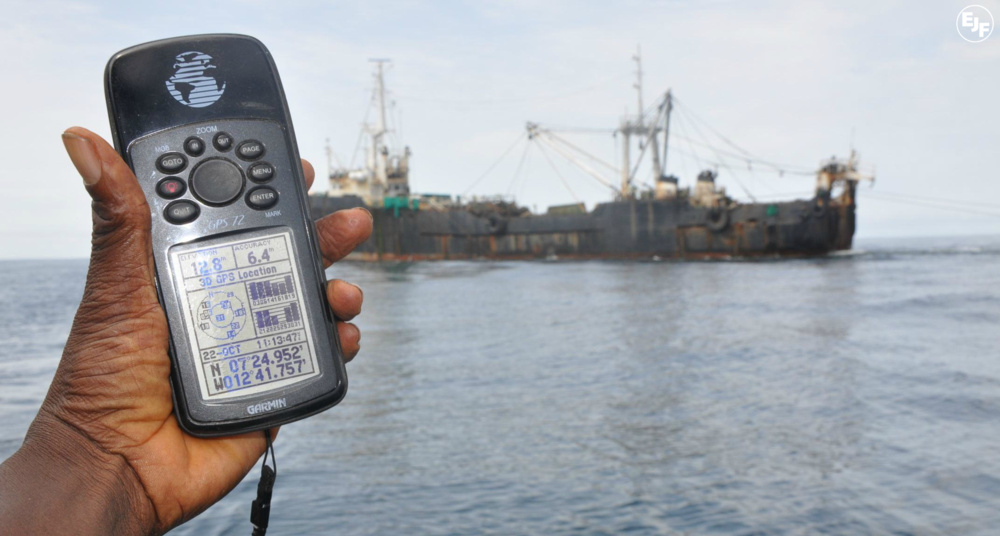
EJF reveals pirate fishing company catering for star athletes
The world’s top athletes have unknowingly been served food by a South Korean company that steals fish from West Africa, EJF has revealed.
The Inter-Burgo Group, which was the official caterer in the athletes' village at the 2011 World Athletics Championships in Daegu, South Korea, is alleged to have been involved in multiple incidents of illegal or pirate fishing in West Africa, a practice which devastates marine environments and jeopardises the livelihood and food security of some of the world’s poorest people.
As the world’s attention was on the World Athletics Championships last week, Inter-Burgo is understood to have paid fines of over US $150,000 to Liberian authorities after one of its large-scale industrial trawlers, Seta 70, was caught fishing illegally in Liberia’s inshore areas reserved for local fishers. Inter-Burgo is a multinational company that operates fishing fleets, a construction company and a chain of hotels, including the Inter-Burgo Hotel in Daegu which was the headquarters of the governing body of athletics during the World Championships.
The Inter-Burgo-owned Seta 70 reportedly tried to avoid capture when detected by the Liberian Coastguard in July by steering erratically and turning off its lights during the night. A Liberian Government fisheries observer on board was reportedly stopped from using communication equipment and was only able to raise the alarm by making a call on his mobile phone while hidden in a toilet. The pursuit came to an end when Liberian authorities fired warning shots before boarding the vessel and bringing it to the country’s capital Monrovia.
In a separate incident in March, EJF documented the same Inter-Burgo vessel operating illegally in neighbouring Sierra Leone, another country targeted by pirate fishing companies due to weak control of its coastal waters. Seta 70 is believed to have laundered its catch by illegally transferring or transhipping it to another of the company’s vessels, the Panama- flagged Seta No. 73, which then brought it to the port of Las Palmas in the Spanish Canary Islands.
Evidence collected by EJF on Seta 70 and three other pirate vessels was provided to European authorities, leading in April to the confiscation of an estimated £4m worth of fish in Las Palmas. This was the largest seizure since the EU introduced a new regulation to end illegal, unreported and unregulated (IUU) fishing in January 2010. The fish all found on board the Inter-Burgo-owned Seta No. 73 is believed to have been caught by vessels that fished in inshore areas, destroyed local fishers' nets, concealed their markings and attacked a local fisher.
However, the consignment of suspected pirate fish was subsequently released to the market by Spanish authorities, following months of meetings between port authorities, fishing companies and fish processors. In Spanish media, Korean fishing companies including Inter-Burgo were reported to have threatened to leave the port of Las Palmas if controls on imports of fish from West Africa were not loosened. So far, Spanish authorities and the European Commission have not commented on the release of the illegal fish, which is now circulating within EU markets.
Meanwhile, Inter-Burgo’s chairman last night confirmed that the group was responsible for the catering in athletes' village at the World Championships but denied that the company’s fishing vessels were responsible for illegal fishing in West Africa. There is no suggestion athletes were served stolen fish or that Inter-Burgo hotels were complicit in any illegal activities of the group’s fishing vessels.
"EJF’s discovery of Inter-Burgo’s role as caterer to the world’s top athletes shows how vigilant we have to be in the fight against pirate fishing. We urgently need better traceability in order that we avoid unwittingly fuelling this destructive activity, that devastates coastal communities, compromises food security and harms marine environments." Steve Trent, Executive Director of EJF
SIGN UP FOR OUR EMAILS AND STAY UP TO DATE WITH EJF